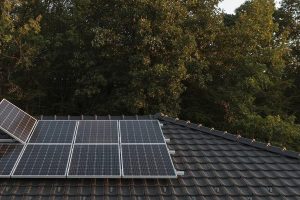In an era defined by urgent need for sustainable energy solutions, solar panels have emerged as a beacon of hope. These sleek, photovoltaic marvels quietly convert sunlight into electricity, offering a clean alternative to fossil fuels that is both renewable and abundant. The adoption of solar power represents not just a technological advancement but a crucial step towards mitigating climate change and preserving our planet for future generations.
Reducing Greenhouse Gas Emissions
One of the most pressing environmental benefits of solar panels lies in their ability to significantly reduce greenhouse gas emissions. Unlike traditional fossil fuels such as coal, oil, and natural gas, which release carbon dioxide (CO2) and other pollutants when burned for energy, solar panels generate electricity without emitting any greenhouse gases. This reduction in emissions helps combat global warming and its associated environmental and societal impacts.
The Intergovernmental Panel on Climate Change (IPCC) has consistently underscored the necessity of limiting global temperature rise to 1.5 degrees Celsius above pre-industrial levels to avoid catastrophic climate change. Solar power plays a crucial role in achieving this goal by providing a clean, renewable energy source that can be deployed on a large scale. As countries around the world strive to meet their commitments under the Paris Agreement, solar panels offer a tangible pathway to decarbonize electricity generation and transition towards a low-carbon economy.

Minimizing Air and Water Pollution
Beyond greenhouse gases, traditional energy sources contribute to air and water pollution through the release of harmful particulates, sulfur dioxide, nitrogen oxides, and mercury. These pollutants have serious implications for public health, ecosystems, and the quality of life in communities near power plants and extraction sites.
Solar panels, in contrast, have a minimal environmental impact once they are manufactured and installed. While the production process does involve some energy expenditure and emissions, these costs are quickly offset by the clean electricity generated over the panels’ operational lifetime. By harnessing sunlight, solar power avoids the environmental degradation associated with resource extraction, transportation, and combustion of fossil fuels, thus helping to preserve air quality and reduce water contamination.
Conservation of Natural Resources
The shift towards solar energy also contributes to the conservation of finite natural resources. Fossil fuels are inherently non-renewable and are extracted from the Earth’s crust at rates that far exceed their replenishment. As reserves diminish, extraction becomes more costly and environmentally damaging, leading to habitat destruction, water depletion, and ecosystem disruption.
Solar panels, on the other hand, rely on sunlight—an infinitely renewable resource that is available in abundance across the globe. The sun’s energy is inexhaustible on human timescales, ensuring that solar power can sustainably meet current and future energy demands without depleting natural resources or compromising the integrity of ecosystems. This renewable characteristic makes solar panels a vital component of a circular economy, where resources are used efficiently and returned to the biosphere or recycled at the end of their lifecycle.
Economic Benefits and Job Creation
In addition to their environmental advantages, solar panels offer significant economic benefits and opportunities for job creation. The rapidly expanding solar industry has become a major driver of economic growth, attracting investment, fostering innovation, and creating jobs in manufacturing, installation, maintenance, and research and development.
Countries that have embraced solar energy as part of their energy mix have seen tangible economic benefits, including reduced energy costs for consumers, increased energy independence, and enhanced energy security. By diversifying their energy sources and reducing reliance on imported fossil fuels, nations can stabilize their energy markets and mitigate the economic volatility associated with fluctuating oil and gas prices.
Empowering Communities and Promoting Equity
Beyond environmental and economic considerations, solar energy has the power to empower communities and promote social equity. Distributed solar systems, such as rooftop installations and community solar projects, enable individuals, businesses, and municipalities to generate their own electricity and reduce their energy bills. This democratization of energy production promotes energy independence and resilience, particularly in underserved or marginalized communities that may face energy poverty or lack access to reliable electricity.
Moreover, the transition to solar power presents an opportunity to address historical injustices and disparities in energy access. By prioritizing equity in the deployment of solar technologies and ensuring that benefits are shared equitably across society, policymakers and stakeholders can create a more inclusive and sustainable energy future.
Conclusion
In conclusion, the widespread adoption of solar panels represents a pivotal moment in the global effort to combat climate change, preserve natural resources, and build a more sustainable future. By harnessing the power of the sun, we can reduce greenhouse gas emissions, minimize pollution, conserve natural resources, stimulate economic growth, and empower communities. As individuals, businesses, and governments increasingly recognize the environmental and societal benefits of solar energy, investing in solar panels becomes not just a choice but a responsibility—a commitment to safeguarding our planet for generations to come. By choosing solar, we choose a cleaner, brighter future for all.



